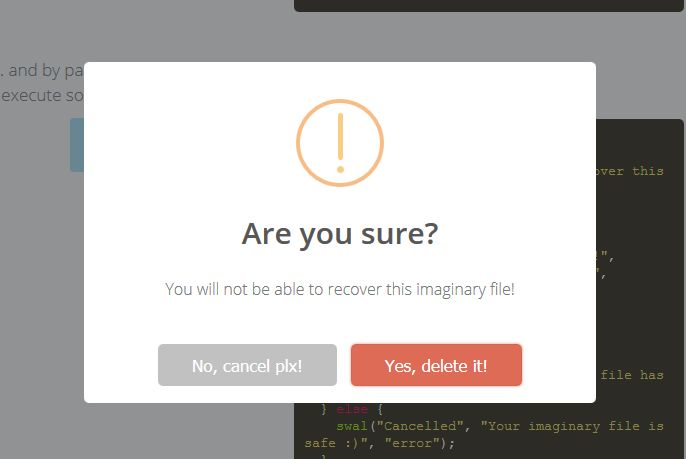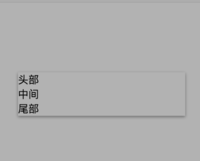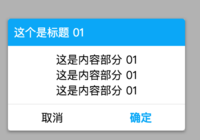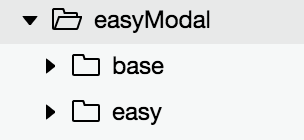

在整个现代前端框架中(不考虑ng react vue),基于组件的声明性呈现路由状态管理适用于基本的四节车厢。另一方面,小程序开发环境缺乏很多特性。好在11月初,微信团队发布了正式的组件方案,我们基本可以告别现有的黑客方法实现组件了。
使用模板实现https://zhuanlan.zhihu.com/p/.组件化使用包含组件化简单地说就是包含组件wxml和样式文件到页面。然后,导入组件的js文件通过合并将组件数据方法合并到页面中。对于数据,首先调用组件事件,然后调用父页面事件。
上述方案核心:将组件中定义的数据和方法组合到页面中,实现组件化。本质上,没有组件范围的隔离,将不可避免地出现命名冲突覆盖。
方便快捷的理解。在这里,我们使用官方组件方案来实现一个模态弹出窗口easyModal。
请看看https://gitee.com/sherlock221的源代码。
阅读前请阅读https://mp.weixin.qq.com/debu官方定制组件文档。
分为两个小组件来实现这个模态弹出窗口:基本模态弹出窗口和增强模态弹出窗口。
microsoft="" pingfang="" sans="" wenquanyi="">基本模态弹窗 具备
1.显示/隐藏2.backdrop3.过度动画4.自定义头尾这几部分基础功能
增强型模态弹窗 具备

1.基础模态弹窗功能2.自定义内容区域3.title自定义4.确定取消按钮自定义

首先在base文件夹下直接右键创建component -> baseModal在baseModal.js中创建组件所需要props 这些属性来自父组件或 外层page 中的数据,
Component({ options : { multipleSlots: true }, /** * 组件的属性列表 */ properties: { backdrop: { type: Boolean, value: true }, animated : { type: Boolean, value: true }, modalSize : { type: String, value: "md" }, animationOption : { type : Object, value : { duration : 300 } } },}下来创建 data,isShow控制 弹窗显示和隐藏 animation则是弹窗动画函数.
/** * 组件的初始数据 */ data: { isShow : false, animation : '' },在生命周期函数 ready中初始化animation
ready: function () { this.animation = wx.createAnimation({ duration: this.data.animationOption.duration, timingFunction: "linear", delay: 0 }); },组件有2个public方法 show hide 方法, private 有执行动画 和 切换显隐的方法
methods: { hideModal : function(e){ if(e){ let type = e.currentTarget.dataset.type; if (type == 'mask' && !this.data.backdrop) { return; } } if (this.data.isShow) this._toggleModal(); }, showModal : function(){ if (!this.data.isShow) { this._toggleModal(); } }, _toggleModal : function(){ if(!this.data.animated){ this.setData({ isShow: !this.data.isShow }) } else{ let isShow = !this.data.isShow; this._executeAnimation(isShow); } }, _executeAnimation: function (isShow) { ...... } }可以通过animated属性来判断 组件是否需要调用_executeAnimation 来执行动画显示
页面结构
<view animation="{{animationData}}" hidden="{{!isShow}}" class='modal'> <view data-type="mask" catchtap='hideModal' class='modal-mask' >view> <view class='modal-layer modal-layer-radius {{modalSize == "sm" ? " modal-layer-sm" : " modal-layer-md" }} ' > <view class='modal-header'> <slot name="header">slot> view> <view class='modal-body'> <slot name="body">slot> view> <view class='modal-footer'> <slot name="footer">slot> view> view> view>slot 节点,用于承载组件使用者提供的wxml结构。默认情况下,一个组件的wxml中只能有一个slot。需要使用多slot时,记得开启配置
options : { multipleSlots: true },下来创建样式wxss具体可以看github 文件这就不贴
/** 模态 **/.modal{ position: fixed; top: 0rpx; left: 0rpx; right: 0rpx; bottom: 0rpx; width: 100%; height: 100%; z-index: 100;}..............需要注意 组件wxss文件 具备隔离性的你在page 中定义的class , 在app.wxss 中定义的class 都无法再组件中使用,如果真有一些需要复用到的样式 可以抽取成一个wxss 通过import 导入 组件的wxss
@import"../../style/font.wxss";
这样会增加组件和业务的耦合度 公共组件不建议使用
接下来可以在业务界面中去使用
<base-modal id="thridModal"> <view slot="header" class='modal-header'> 头部 view> <view slot="body" class='modal-body'> 中间 view> <view slot="footer" class='modal-footer'> 尾部 view>base-modal>
别忘了在业务页面的json中引入组件
{ "usingComponents": { "base-modal": "/component/easyModal/base/baseModal" } }还记得我们上面baseModal 有两个public方法 怎么样去调用呢 这里介绍下
Component 的一个实例方法 selectComponent通过它 可以找到子组件实例 这个有点像是 jq 选择器 通过selector去寻找dom(但是不是dom是js对象) 不过它更像是 react 或 vue ref this.$refs.xxx 获得组件实例.
我们给
onReady: function () { this.thridModal = this.selectComponent("#thridModal"); },然后就可以调用实例的public的方法.
this.thridModal.showModal();this.thridModal.hideModal();
增强模态窗是基于baseModal的.
{ "component": true, "usingComponents": { "base-modal" : "../base/baseModal" }}注意 增强模态窗口 需要包含 基本模态窗口 json中引用才能使用
<base-modal id="baseModal" modalSize="{{modalSize}}" animated="{{animated}}" backdrop="{{backdrop}}"> <view slot="header" class='modal-header'> <text>{{title}}text> view> <view slot="body" class='modal-body'> <slot>slot> view> <view slot="footer" class='modal-footer'> <text catchtap='_cancelModal' class='btn btn-default'>{{cancelText}}text> <text catchtap='_confirmModal' class='btn btn-primary'>{{confirmText}}text> view>base-modal>说下event部分 确定 取消按钮是需要 向外部page 发送事件通知的其进行业务操作的
//cancel _cancelModal : function(){ this.hide(); this.triggerEvent("cancelEvent"); }, //success _confirmModal : function(){ this.triggerEvent("confirmEvent"); }通过triggerEvent触发事件 这点和官网文档没有区别.
业务Page界面:
<easy-modal id="easyModal" title="这个是标题 01" bind:cancelEvent="_cancelEvent" bind:confirmEvent="_confirmEventFirst" > <view class='modal-content'> <text> 这是内容部分 01 text> <text> 这是内容部分 01 text> <text> 这是内容部分 01 text>